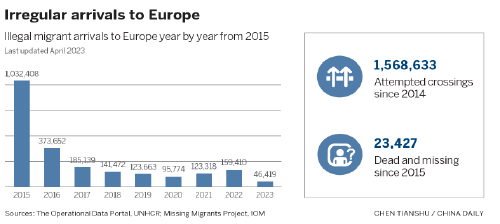Europe stares at refugee crisis

Key factors

Pablo Swedberg Gonzalez, an economist and professor at the IE School of Economics, Politics and Global Affairs in Madrid, said key factors for international migration include "negative conditions in the source country, known as push factors, and positive conditions in the destination country, known as pull factors".
"The most relevant push factors comprise famine and poverty, low wages and unemployment, religious or gender persecution, violence, social immobility and, increasingly, natural disasters," Gonzalez said. "Individuals are willing to take the risk to escape poverty, find safety and freedom. In many cases, crossing the sea may be seen as a necessary step for survival."
Destination countries with exposed external borders have tightened their policies, with strategies including reducing sea rescue resources or offering support to third countries to intercept migrants, which some groups have described as inhumane or political.
"While countries have the right to control entry into their territory, they must balance this with their protection responsibilities and the humane treatment of people," Mittelstadt said.
"Pushbacks, cessation of search and rescue, refusal to allow ships to dock and harsh externalization measures put lives at risk and often are ineffective in stemming movements over a longer period of time.
"The first three months of 2023 have witnessed more deaths in the central Mediterranean in smuggler boats than seen since 2017. The International Organization for Migration, among others, has called for states to halt criminalization of NGO operations to rescue migrants at sea, or obstruction of their work."
Gonzalez said there are also perceived economic and national security concerns, especially since waves of terrorist attacks in Europe between 2015 and 2017.
The pandemic and the Russia-Ukraine conflict have put additional budgetary constraints on European governments that hamper their provision of support to migrants, including refugees.
"The flip side is that more restrictive policies can also increase the risks faced by migrants who are forced to choose increasingly dangerous routes," Gonzalez said. "International human rights law guarantees all people the right to life and security of a person."
The EU's migration system is complicated by national- and EU-level decision-making, and Gonzalez said this can create "inconsistencies and confusion" in policies and practices, and other commentators have even raised the idea of "designed dysfunction".
Zheng Wanyin in London contributed to this story.
jonathan@mail.chinadailyuk.com

































